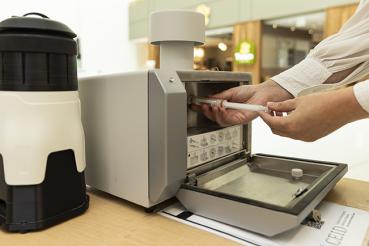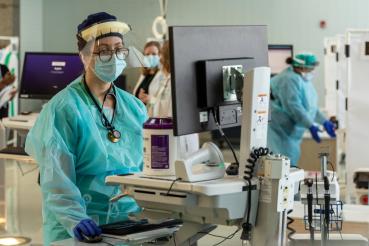During the COVID-19 pandemic, Rush University Medical Center’s respiratory care team not only has provided high-quality patient care but also has paved the way for better COVID-19 treatments and patient outcomes. This hard work earned the team dual APEX Recognition Awards in the acute care hospital and educational program categories.
The Medical Center is the only institution in the United States to be honored in two categories of the APEX Recognition Award, which the American Academy for Respiratory Care bestows to recognize the significant contribution of respiratory therapists and highlight best practices in respiratory care.
Crucial role in fight against COVID-19
When the COVID-19 pandemic began, there were many unknowns, including how best to treat patients who suffered severe respiratory symptoms. Rush’s respiratory team provided urgently needed care on the frontlines while researching the best treatment options for patients with severe COVID-19 symptoms.
The team soon changed the landscape for COVID-19 treatments with its research and implementation of proning, a treatment where patients lie face down on their beds for 16 hours at a time, with heated, humidified oxygen flowing through tubes in their noses. This treatment has seen success in improving breathing problems in patients with COVID-19.
“Respiratory therapists have been essential during the pandemic, due to the severe hypoxemia experienced by numerous COVID patients,” said David Vines, PhD, MHS, RRT, chairperson of the Department of Cardiopulmonary Sciences in the College of Health Sciences at Rush University, and director of the Master of Science in Respiratory Care program.
“Their ability to provide various therapy and support devices to prevent these patients from being intubated has been life-saving. The tireless efforts and dedication of our therapists are greatly appreciated.”
Rush University’s respiratory care students also have made an impact during the pandemic, volunteering to assist respiratory therapists across the Medical Center. With continuous oversight, the students assessed how intubated patients were responding to ventilators’ flow of air, and they monitored the smallest, minute-by-minute details and reported any notable changes. They also routinely repositioned patients, suctioned away excess saliva and otherwise ensured the patients were attended to fully.
“The students are seeing firsthand how a crisis like this can and should be handled,” said J. Brady Scott, MSc, RRT-ACCs, director of clinical education for the respiratory care program. “They are working shoulder-to-shoulder with amazing respiratory therapists each day, and they are seeing firsthand how hospital departments might need to seek novel approaches to staffing, equipment utilization and daily operations. They are not reading about it in books — they are living it.”
“The respiratory care program provides a high-quality education relevant and professionally sound to meet the respiratory care leadership needs at Rush and in the health care community,” Vines said. “It is essential that our respiratory therapists can ‘do’ various therapy and ‘think’ about what’s best to achieve the patient’s targeted goals.”
About the Apex Award
APEX awards recognize respiratory care departments that exhibit high-quality patient care in the United States. The award also requires a minimum of 50% of the staff hold a bachelor’s degree or higher and be active in the American Academy for Respiratory Care. The staff must all be licensed, with 80% or more holding the advanced registered respiratory therapist credential.
“The integration of the education program and clinical services at Rush makes our department unique in the respiratory care profession. This collaboration has led to innovative solutions in our clinical practice,” Vines said. “We have an exceptional team of respiratory therapists, faculty, students, and leaders.”





